|
FAQs on the Ctenophorans, Scyphozoans and
Hydrozoans called Jellyfishes 2
Related Articles: Jellyfishes, Scyphozoans, Hydrozoan Jellies, Hydrozoans, Cnidarians,
Related FAQs: Jellies 1, Jelly Identification, Jelly Behavior, Jelly Compatibility, Jelly Selection, Jelly Systems, Jelly Feeding, Jelly Disease, Jelly Reproduction,
|
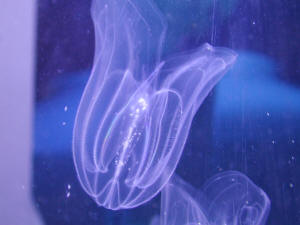
|
|
Moon Jellies 9/30/16
Hi Crew,
<Cathy>
Very grateful for the site.
<Glad to hear you use us as a resource... Don't forget to spread the word
:)>
I have a cubic setup for jellyfish it has been set up for 10 months.
<Not ideal for jellies, but that's okay. Most jellies do best in a round
tank, like a circle on its side.>
The problem I am having is a pod explosion.
<Copepod, I assume?>
They are everywhere, I know wish it was my display tank but no has to be
jelly tank.
<Aquarist problems :) I've had this happen with Coraline algae a lot. It
grows in my refugium, but not my display tank.> Anyway, the problem seems to
be that as jellyfish don't actively seek out their food they just sort if
bump into it so they are full with pods. I don't think they can digest the
pods due to the shells ( I think ).
<They should be able to digest them, but I would add another plankton of
some sort to their diet as well>
Therefore they are shrinking, starving. I have done water change after water
change can't put a dent in the pod population the balancing act due to the
sensitivity of the jelly fish to minor changes in water chemistry is making
it stressful as well. I have used a filter sock to just filter the existing
water through as well but that didn't help either. Short of pulling down the
whole setup and taking out all the biological media and starting again do
you have any suggestions? If I strip out the system and re-set up how do I
cycle without biological media? ( currently have a piece of live rock and
some small bio tubes in chamber). Please help started with 1 large moon
jelly fish, 2 medium, and 1 small, down to large turned medium, 1 medium,
minute 2 disappeared.
Thank you
Cathy Napoli
<So sorry about your losses, Cathy. Could you inform me of the tank size,
water quality, salinity, etc., as well as some pictures of the jellies? My
advice for now would be to get a turkey baster and suck out as many pods as
you can. Set them in another tank or holding container. I would begin to
spot-feed the jellies with the baster instead of hoping they will hunt on
their own. This will ensure they get food to their little bodies. Please do
send pictures and the aforementioned information. In the meantime, read
here:
http://www.wetwebmedia.com/jellysysfaqs.htm and
http://www.wetwebmedia.com/jellyfdgfaqs.htm Hope to hear back
soon. Cheers, Gabe.>
Re: Moon Jellies 10/3/16
Hi Gabe
<Cathy>
Thanks for the response. The tank is a cubic brand circular tank on side
specifically designed for jellies.
<My bad. I assume cubic shaped, not cubic brand>
I spot feed Rotifers and the food preparation sold specifically for jellies.
<Great>
Prior to the pod explosion you could see the food In their bellies. Red
brown color now white.
<Probably stressed out from the pods>
Ammonia 0
Nitrates 0
Nitrite 0
Ph. 8:2
Phosphates .02
Salinity 1.026
Temp 25c
<Hmm. At this point, I would continue to spot feed and hop for the best.
Water seems to be in perfect conditions. Read more on WetWeb re. Cheers,
Gabe>
Re: Moon Jellies 10/3/16
Hi Gabe
<Cathy>
Accidentally pressed send hopefully you can see the pods as well as food
remains and tank type.
<Holy pods!!! You weren't kidding when you said there was an outbreak!>
Pods too numerous to symphony
<Siphon?>
with turkey baster although I do try to do it. Due to water changes/
symphonies
<Siphons again?>
being frequent have been putting in my refugium.
<Not sure how they got so out of control here. The only way to get rid of
all of them would be to start from scratch. I hate to say it, but that's the
only way to get all of them out. I know it can be a pain, especially with
jellies, but it may need to be done. Good luck. Cheers, Gabe>
|
.JPG)
.JPG) |
Variation in hydroids? 4/15/06 Good day WWM
crew! You folks the bomb! <Boom, boom da boom...> Sew,
I noticed on ReefCentral, on their current (4-14-06) homepage, for
their slideshow presentation, they have some images of hydroids mixed
in there. <Are common in shallow reef environments...> I've
had what I thought to be a rather small colony though spreading all
over rockwork, of polyps. They look like a mini version of
snake polyps or a variation of a small yellow polyp. I can
provide images if needed. <Please do> My question,
mainly.....these guys in my tank, that look almost identical to the
slideshow on ReefCentral, retract when touched or if anything moves or
swims by them.....so, are there any species of hydroids that retract?
<Likely so> If so, I would have never known such....and am
craving a definitive answer. Thanks very much for your time,
look forward to hearing from you. Hydroidy polyp. <Please read here:
http://wetwebmedia.com/hydrozoans.htm and the linked FAQs file
above. Bob Fenner>
Scyphozoa Question 6/16/08 Hi, <Greg> I have
discovered that I have what appears to be several jellyfish
(Scyphozoans) in an aquarium I use for experiments. <I saw a
bunch of settled Ctenophores in shops this last wknd. in Phoenix.
Okay, your turn> The system (less than 1 gallon) is unfiltered
with no outside inputs except for a very small amount of
air from an air stone. I had ordered some rotifers about a year
ago and placed them in the system. <Ahh!> They did not last
very long. I cleaned off some algae from the side of the system
recently and noticed jellyfish that are about 2 mm maximum in
size. I am assuming jellyfish eggs or planula came in the
rotifers batch I received last year. <Likely so> Their
locomotion is identical to larger jellies. They have a
clear/translucent bell, some reddish/maroon color inside the bell
and translucent tentacles or oral arms. <Neato> Have you
ever heard of captive jellyfish outside of a large institutional
(city/corporate) aquarium? <Oh yes... in fact, a friend, Jim
Stime, makes/sells Jelliquariums... and I saw some very nice,
much cheaper models a couple weeks back at the Interzoo show in
Germany... it's a biz> Do you know of sources I could use
to identify these guys? <Mmm... am referring you to Jim Stime
here... you can also reach him via Jelliquarium (.com)> I
cannot provide a picture easily. They are too small for my camera
equipment. <Macro settings, large file size... cropping...>
-- Thank you, Greg S. Hurley <Ahh! Had a fine H.S. Geometry
instructor with your family name here in San Diego... years back!
Cheers! Bob Fenner>
Re: Scyphozoa Question
6/16/08 Hello Gregg and Bob, The jellyfish portion of the
hobby is just now becoming possible. As such there is very little
information available... but its increasing. I have kept, for
only a short time, Ctenophores, but have not been involved with
their reproductive cycle. Moon jellyfish are the most common and
have the greatest amount of research and information available.
These are the pale white discs with short fringe tentacles around
the rim and the familiar four-leaf clover pattern within the
bell. Most jellies have a polyp stage where the medusa
strobilates or a-sexually buds off from the oral disc portion of
the polyp. Once the juvenile has freed himself he is now called
an Ephyra. It takes another 60+ days to raise these jellies to 2
or 3 inches. Here is a short video of my jellyfish production
system >>
http://www.lafishguys.com/midwater/JellyNursery001.htm <<
Based on your comment about " some reddish/maroon color
inside the bell " I suspect what you are either seeing the
food stuff brought up into the stomach of a Moon jelly species or
you may possibly have a species of Sea Nettle, Chryasora species.
These tend to have much longer tentacles... and ones that sting
too. Aside from the Upside-down Jellyfish all other species
typically require a tank that keeps the jellies suspended once
they have bud-off from the polyp. Here is an article I wrote on
the process >>
http://www.jelliquarium.com/DocumentPage.aspx?id=1034 <<
There are only a few good books available on jellies. Most are
written for 4th graders. Let me know if I can help you further.
Jim Stime, Jr. 805-241-7140 Aquarium Design
www.aquarium-design.com MyFishTank.com www.myfishtank.com
Midwater Systems www.jelliquarium.com LA Fishguys
www.lafishguys.com <Ahh! Thank you Jim. BobF>
Re: Scyphozoa Question 6/16/08 Hi Bob, >>
I saw some very nice, much cheaper models a couple weeks back at
the Interzoo show in Germany... << Can you tell me anything
about these systems ? <I picked/saved up some lit to give you
I picked up... just got to find it again!!! BobF> Jim Stime,
Jr. Most impt.... they were very nice... and cheap... like about
a fourth of yours in cost... Trouble if they're offered in
your mkt. for shore. B.
Re: Scyphozoa Question 6/16/08 Bob and Jim, <Mr.
H.> Thanks for the info. I think I might have to get into
jellyfish. Sounds like a fun new challenge. <Are indeed>
Thank you, Greg S. Hurley <Welcome Greg. BobF>
|
DIY Food 3/23/07 Hi Bob. <Hello Brandon
in Bob's stead.> I have been making my own DIY food.
<Cool.> I have put in sliced and fresh jellyfish in it.
<Hmmm. What kind of grocery store do you have in
town?> Blend it with all the other food. Some said that jellyfish is
not in the diet of fish and corals so I was wondering if it will cause
any harm. <This is sort of true. There are fish that will
eat them such as the Banner Fish, Arrow Crabs have bee known to eat
them as well as certain other fish and snails.> I only considered
the addition of jellyfish after looking up for its nutritional value.
It is part of the diet of sea turtle. <This is true.> Is it all
right to have jellyfish as part of the diet for fish and corals? <I
would not be concerned with the addition. I would watch the
fishes after I fed it to them looking for abnormal
behavior. Brandon.>
Keeping upside-down
jellies 4/10/06 Hey, you guys are awesome! There
is so much info on your site, I could look at this stuff all day
long--and almost have! I have a question about upside-down
jellies. I take care of a 125 gallon tank with 8 jellies in
it. The company that owns this tank has a budget on how much
they can spend on the tank so they don't have the best set-up for
it--they went the cheap route. <If it works...> I am
looking into getting new equipment for this tank, tell me, if you had a
125 gallon tank with 8 jellies, what would you get for the tank?
<...? Lighting, filtration?> I've been researching non-stop
in books and on the internet to get as many opinions as I can and you
guys seem to know your stuff! So, to be specific: What kind of
substrate would you have, would you have any plants? <Soft, fine
coral sand... and yes... vascular plants from the same area as this
species... might be able to be collected...> Would you have a
protein skimmer, how about a UV sterilizer? <Yes to the skimmer, not
likely a UV> How about the lights, what would be the best lights for
them? <T-5 fluorescents likely...> What and how much would you
feed them and how often would you feed them? <Depends on the
species... are these Cassiopeia? http://jellieszone.com/captivejellies.htm>
And lastly, I have been having a red/brown algae problem-- it is like a
sheet of algae over the top of the substrate. I stir it up daily and
that seems to help for awhile--until the next day and I have to do it
again. I've been researching ways to treat the stuff,
but I am so skeptical because I don't want to harm them and I know
how sensitive and delicate they are. Thank you so much for your help,
it is greatly appreciated! Candace <... See WWM re controlling BGA.
Bob Fenner>
Tiny Jellyfish 2/23/06 Hi Guys!
<Lesley> Hope you are keeping well - it's been a while since
I last contacted you so I hope you are all ok. <I am, thanks> Two
days ago, in the smaller of our two marine tanks, I noticed three, tiny
white jellyfish-type critters - literally, the mushroom shape, but no
tentacles - quite "stiff" in structure and jerky in movement
as opposed to the more fluid, typical jellyfish. They were about 2mm -
3mm in diameter and were "swimming" around the tank being
ignored by the fishy occupants. I think they're cute!
Anyway, today, I counted 7 of these tiny critters, varying in size from
about 1mm to 3mm across the top of the "mushroom". I still
think they're cute but have no idea what they actually are or where
they came from as we haven't added anything new to the tank for
several months. I wondered if you could help. Sorry the
description is so vague. Also, they are too small to photograph
clearly. Any light you can shed on this would be most
appreciated! Many thanks! Lesley Saxton <There are quite a few
Scyphozoan and Hydrozoan Medusoid animals that can strobilize from hard
surfaces introduced in our marine systems... Use these terms in your
search tools... and you'll see. Bob Fenner>
Upside-Down
Jellies 2/23/06 Hey, you guys are awesome! There is so
much info on your site, I could look at this stuff all day long--and
almost have! I have a question about upside-down jellies. I
take care of a 125 gallon tank with 8 jellies in it. The
company that owns this tank has a budget on how much they can spend on
the tank so they don't have the best set-up for it--they went the
cheap route. I am looking into getting new equipment for
this tank, tell me, if you had a 125 gallon tank with 8 jellies, what
would you get for the tank? <...? Please see the new:
Jelliquarium.com site here> I've been researching non-stop in
books and on the internet to get as many opinions as I can and you guys
seem to know your stuff! <Do you have the works of Dave Wrobel?
Search re his name...> So, to be specific: What kind of substrate
would you have, would you have any plants? Would you have a protein
skimmer, how about a UV sterilizer? How about the lights,
what would be the best lights for them? What and how much would you
feed them and how often would you feed them? And lastly, I have been
having a red/brown alga problem-- it is like a sheet of alga over the
top of the substrate. I stir it up daily and that seems to help for
awhile--until the next day and I have to do it
again. I've been researching ways to treat the stuff,
but I am so skeptical because I don't want to harm them and I know
how sensitive and delicate they are. Thank you so much for your help,
it is greatly appreciated! Candace <Keep searching, reading... Bob
Fenner>
| Baby jellies... or some other creature?
1/4/06 Hi crew, <Chris>
Sheesh. I had to get creative to photograph these
critters. I snagged one with an eyedropper, placed it in a water
drop on a slide, and popped it into my $20 National Geographic
'scope. After removing the eyepiece shield, I was able to snap
a few photos of reasonable enough quality for ID purposes... I
hope. <Neat> These pics are slightly out of focus, but the
best I could get and still get the whole thing.
('scope/lens/user? limitations) I've seen some dozens of
these, over the past few days, in my 55G saltwater tank. I'm
seeing fewer lately, due to losses in my power heads and/or
filtration, I suppose. (Or predation?) <A combo. no doubt> I
didn't notice them today, until swishing around my LR with a
turkey baster... blowing off some food that had 'settled'.
(Perhaps these had 'settled' too... and I stirred them up?)
<Likely so> Anyhow, they look for all the world like
mini-jellyfish of some sort, though I couldn't imagine from
whence they came. My only recent addition is a 6" ball of
Caulerpa Racemosa from my QT. (Note that this QT also contains
assorted amphipods, worms, and other tiny marine life that has
accumulated over time) The Caulerpa had been in the QT for three
weeks. <Mmm, are some sort of Medusoid life> Most are about
the size of this period. (Some are a bit larger) The photos show
the rest of my observation. At "rest", they're full
of water, their "valve" is closed, and you can see a few
small protrusions between the two dark spots at the valve end. To
move, they appear to expel water through the 'valve', and
they contract axially, while extending longitudinally. (Moving away
from the 'valve' end, of course) <Yes> Enough of my
rambling, I suppose. Please edit and ditch any irrelevant babbling
as you see fit. I won't mind. Do these look like anything
you've seen before? <Mmm, yes... juvenile
"jellies" of some sort (Scyphozoans, Hydrozoans) or
Ctenophorans...> Feel free to whack me in the head with a book
of your choice, if these are something very common that I
should've found on a simple web search. (I looked, but perhaps
not hard enough) Tell me if you need more info, tank
specs/inhabitants, etc... Thanks in advance, Chris
<I wouldn't be overly concerned re these being in your
system... likely "strobilized" from the new algae... or
some other substrate. Will pass with time. Bob Fenner> |
|
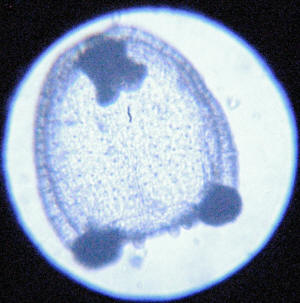 
|
Comb Jellyfish 12/13/05 Hi Bob, <Jimbo>
Quick note. See attached picture <Nice> The jellyfish product
line keeps growing. I just received a shipment of Comb Jellies out
of Key West last week. <How old are most comb jellies? Most are
in their teens (Ctenophora)> Under the MH their fine rows of
hairs reflect the light in a UFO landing strip type light show.
Awesome ! Jim Stime, Jr. Resplendent Group Aquarium Design
www.aquarium-design.com MyFishTank.com www.myfishtank.com Midwater
Systems www.jelliquarium.com Centropyge. Net www.centropyge.net
MACNA X www.masla.com/macnax.html
<Beauty. Bob Fenner sans list> |
|

|
| Jellyfish System 9/20/05 hi Bob, <Jimbo> well, it
is the night before i drive out to Las Vegas for the Super Zoo pet
trade show to exhibit the JelliQuarium. i hope i have everything
packed :) <Me too!> i have not had much of a
chance to get all the Jellyfish things together that we spoke of as
i have been busy getting everything for the trade show squared away
but i do want to get some stuff to you. i am working on the
advertisement for both FAMA and Aquarium Fish Magazine. you were
correct about FAMA's circulation being down, its around 10,000/
mth, AFM is up around 50,000/ mth. i asked for Susan Steele but she
was not around. i am working with Craig Horowitz. <Good... I
called re Sue... s/w Alicia Jordan... who is heading up FAMA...
said Sue had "not elected" to move down... was consulting
somewhat... I'd call Bowtie/Fancy corp. and s/w Alicia re who
in turn to speak with> the scientific article written by Kevin
Raskof i mentioned is attached as a PDF. it is a great article.
<Will take a look/see> also attached are pictures i took of
the various stages of growing Moon Jellyfish, Aurelia aurita....
<Very nice> 2027 polyps 2031 polyps 2039 sm jelly
2040 two sm jellies 2058 current holding /
growing system 2077 Ephyra ( babies ) 2078
Ephyra ( babies ) 2097 Mastigias papua sp. 2098
Mastigias papua sp. have a great time in Kona next month, i will be
thinking of you in paradise :) <And joining me soon I
hope/trust. BobF> Jim Stime, Jr. Resplendent Group Aquarium
Design < http://www.aquarium-design.com/>
www.aquarium-design.com MyFishTank.com < http://www.myfishtank.com/> www.myfishtank.com Midwater
Systems < http://www.jellyfishtanks.com/>
www.jellyfishtanks.com Centropyge. Net < http://www.centropyge.net/> www.centropyge.net MACNA
X < http://www.masla.com/macnax.html>
www.masla.com/macnax.html |
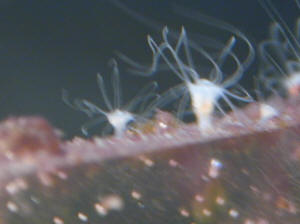
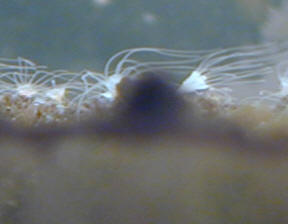 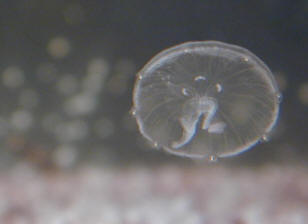 |
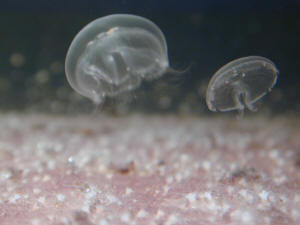
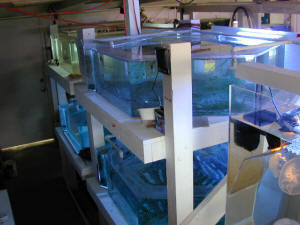 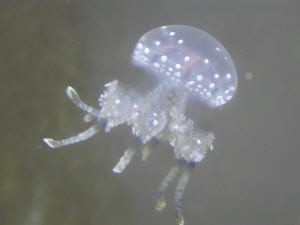 |
|
|

